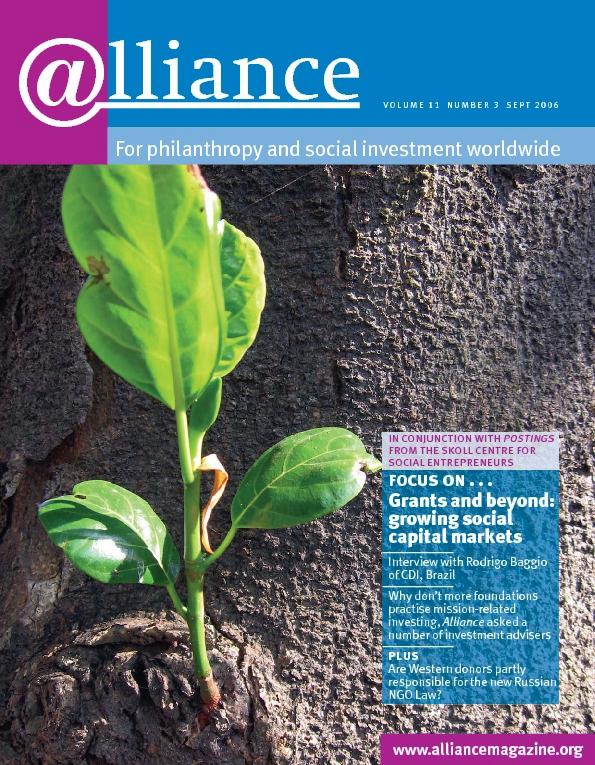In the June issue of Alliance, Bruce Sievers wrote an opinion piece, ‘Miserable Measurables’. For a moment, I thought I had a copy of a magazine from 1996 since we now live in the age of Mighty Measurables and anybody not working on delivering measurables – or even questioning the use and purpose of them – is fighting an already lost battle.
According to the article, the quest for measurable outcomes of grants is rooted in applying the ‘business model’ to civil society organizations. Businesses are by definition profit-seeking enterprises based on individual self-interest. Maybe that was the case in 1996, but since then a lot of companies, thanks to civil society and its organizations, have realized there is more than profit and self-interest. Profit may still be number one, but People, Planet and more have come to the board room. So the idea expressed in the article that companies have to pass only a single test, ‘Did you make money or not?’ is outdated for today’s – let alone tomorrow’s – companies. Implicitly, therefore, the article’s thesis, relating to CSOs, is outdated as well.
True, some goals may not be easy to measure, but that doesn’t mean we should abandon the whole idea. There were two examples in the article, Big Brothers Big Sisters and Meals on Wheels. The author suggests that, with this type of work, trying to relate particular grants to particular measured results is a fool’s errand. Well, maybe, maybe not. I am not an impact evaluation expert. But I do know that it is not very difficult to explain to any grant-giver that his or her grant was able to cover one particular activity and then explain what was achieved. Or, in the case of small donations used for a large activity, to explain that and then explain what these small donations together have achieved.
I am not familiar with the first example but Meals on Wheels is known in Holland as well. If the purpose of the programme is to deliver 500 meals a month, then that is the first measure. As to the treasured conversations between the volunteers and recipients that, according to the article, cannot be captured by simplistic outcome measures, who is asking for ‘simplistic’? Outcome measures will do! Have an independent, critical and trusted party interview these volunteers and recipients (if necessary, anonymously). Most grantees will not request a rigorously scientific research result, and this method could certainly provide enough material for grantees who want outcome measures that they can understand. Simple can be more effective than scientifically sound, as long as a good, clear picture of the results in both numbers and qualitative data emerges. So 500 meals a month delivered, and some good interviews that might include numbers as well, will be the first step towards Mighty Measurables.
Let’s put more time and effort into answering the really important question of how to deliver Mighty Measurables. Let’s stop simplifying and saying what we can’t do. Companies are giving up the idea that they need only to make a profit and are realizing that the way they make that profit counts nowadays as well. In the same way, CSOs should give up the idea that they need only to do good. It is time they started showing how good they are at doing good, not turning back because measurables seem to be miserably difficult …
Henk J Th van Stokkom Self-employed and working with charitable foundations and for-profit investment funds in The Netherlands





Comments (0)